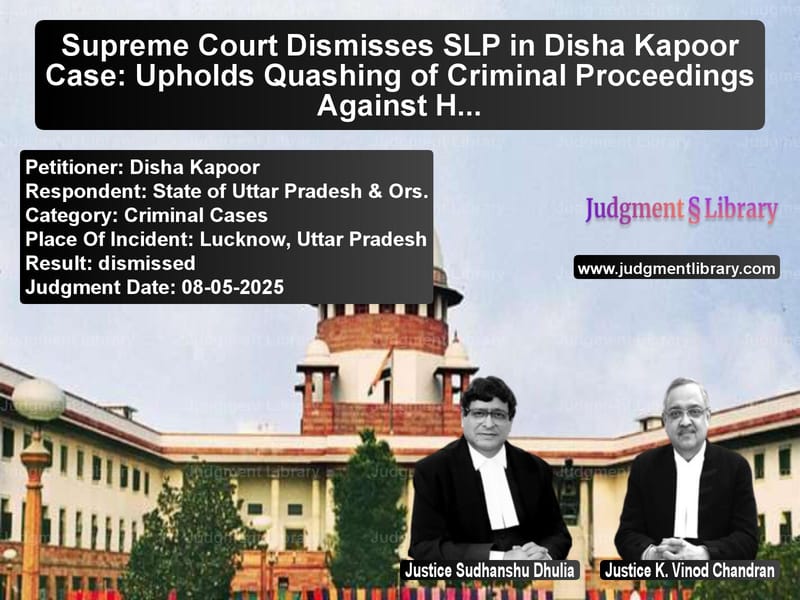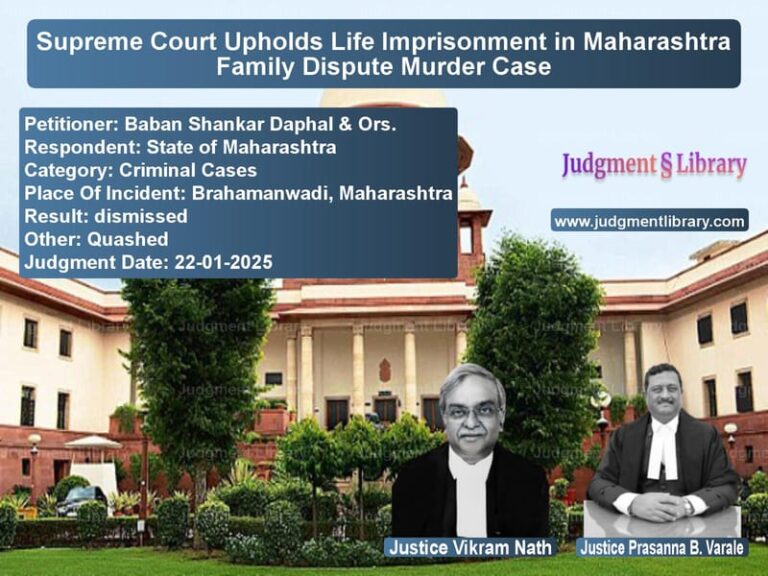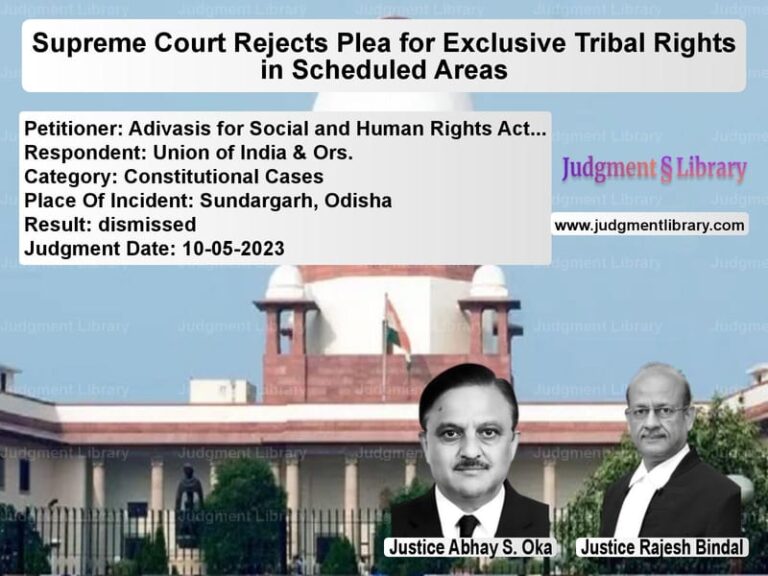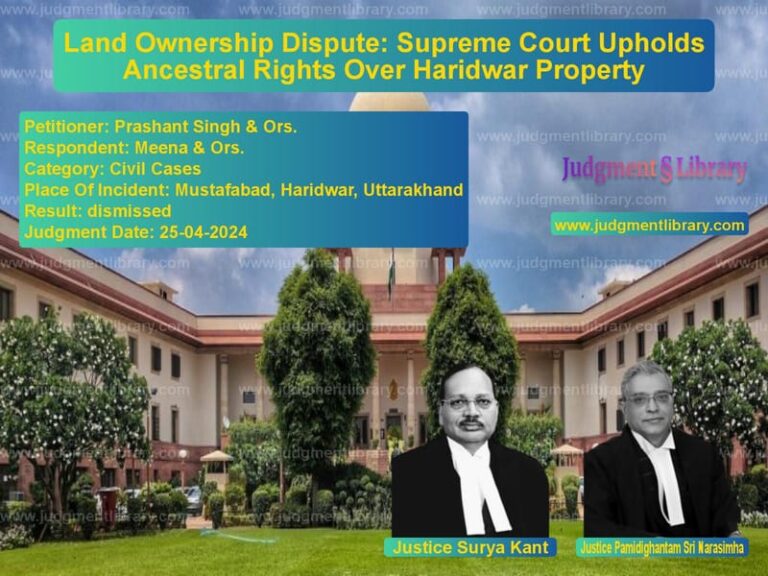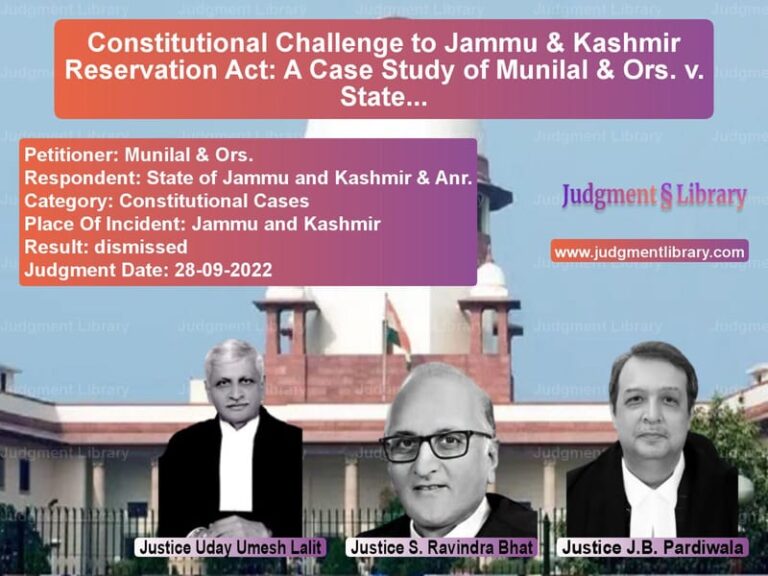Supreme Court Dismisses SLP in Disha Kapoor Case: Upholds Quashing of Criminal Proceedings Against Husband’s Family
In a significant ruling that highlights the judiciary’s concern about the misuse of anti-dowry laws, the Supreme Court of India recently delivered a judgment that emphasizes the need for careful scrutiny of matrimonial cases involving multiple family members. The case of Disha Kapoor versus State of Uttar Pradesh & Others, decided on May 8, 2025, brings to the forefront the delicate balance between protecting genuine victims of domestic violence and preventing the weaponization of legal provisions to harass innocent relatives.
The legal saga began when Disha Kapoor approached the Additional Chief Judicial Magistrate in Lucknow with a complaint alleging offenses under Section 498A (cruelty), Section 325 (voluntarily causing grievous hurt), and Section 506 (criminal intimidation) of the Indian Penal Code, along with Sections 3/4 of the Dowry Prohibition Act, 1961. What made this case particularly notable was the sheer number of people implicated – the petitioner had named ten family members as accused, including her husband, his parents, two paternal uncles, their wives, and three children of the brothers, essentially targeting almost the entire extended family.
The Magistrate, after thorough examination of the complaint and statements recorded under Sections 200 and 202 of the Criminal Procedure Code, identified numerous contradictions in the complainant’s narrative. The court specifically relied on the precedent established in Geeta Mehrotra and Anr. v. State of Uttar Pradesh and Anr., and decided to issue summons only against the husband, father-in-law, and mother-in-law, while refusing to summon the other seven family members. This decision was grounded in the principle that involving all family members without specific allegations against them constitutes an abuse of the legal process.
Challenging this limited summoning order, the husband and his parents moved the High Court of Allahabad under Section 482 of the Cr.P.C., seeking quashing of the entire proceedings. The High Court, in its judgment, placed significant reliance on the landmark case of Preeti Gupta and Anr. v. State of Jharkhand and Anr., which had expressed serious apprehension about the increasing trend of matrimonial litigation embroiling not just immediate family but extended relatives as well. The High Court referenced the precedent which “noted with anguish the rapidly increasing matrimonial litigations in the country roping in the close relatives of the husband and even members of the extended family, as in this case, on allegations of harassment. This requires the Courts to be doubly cautious and extremely careful in dealing with such complaints, especially since the ultimate object of justice is to find out the truth and not only to punish the guilty but also to protect the innocent.” The High Court underscored that when proceedings are found to be an abuse of the court’s process, the power under Section 482 must be invoked to secure the ends of justice, and accordingly quashed the entire criminal proceeding.
Disha Kapoor, aggrieved by the High Court’s decision, approached the Supreme Court through a Special Leave Petition. The petitioner’s case was presented by Mr. Ajay Kumar Singh, while the respondents were represented by Mr. Dinesh Dwivedi, learned Senior Counsel, and Mr. Shaurya Sahay.
The factual matrix of the case revealed a complicated marital relationship. The marriage was solemnized on December 11, 2019, with considerable fanfare, given that the groom’s grandfather was a respected former Governor. The petitioner alleged that while the grandfather was alive, she was treated with respect, but after his demise, mental and physical harassment began not only from her husband and his parents but from the larger family as well. She specifically accused one of her uncles-in-law, who held a Ministerial position, of threatening to have her killed. She claimed to have been forcibly ejected from the matrimonial home on September 28, 2020, after being assaulted and sustaining a fracture on her hand.
However, the chronology of events presented several inconsistencies. The petitioner admitted to returning to her matrimonial home on October 8, 2020, and again on December 16, 2021, accompanied by her mother. During the latter visit, she alleged that family members verbally abused them and demanded Rs. 50 lakhs and a Fortuner car as dowry to permit her to resume cohabitation. Nevertheless, the Supreme Court noted serious discrepancies between her complaint and her statements recorded under Section 200 Cr.P.C. While the application under Section 156(3) mentioned multiple family members mistreating her, her Section 200 statement only referred to one Subodh Tandon, a cousin of the husband, making the dowry demand. Significantly, the statement under Section 200 contained no allegation about being expelled from the matrimonial home on September 28, 2020.
The Court also observed that “there is no specific allegation of any physical violence except for vague statements made about the petitioner having been beaten up, in which she sustained a fracture and having been subjected to physical and mental torture. There is no evidence of a treatment undergone to substantiate the allegation; especially when the petitioner is said to have suffered a fracture.”
Perhaps the most damaging to the petitioner’s case were the contradictions emerging from her own affidavit filed in the parallel matrimonial proceedings. In her written statement before the Family Court, she had described the initial matrimonial life as “very cordial and even pleasurable.” She admitted that the husband had given her a cheque of Rs. 50,000 on October 26, 2020, for purchasing gifts for ‘Karwa Chauth’ and Diwali, and that she had bought an expensive saree for the occasion. The Supreme Court highlighted the fundamental inconsistency: “The statements made on affidavit regarding the amounts given on 26.10.2020 by the husband to the wife for purchase of an expensive saree to celebrate ‘Karwa Chauth’ is after 28.09.2020, the date on which the petitioner alleges she was thrown out of her matrimonial home. It is also after 08.10.2020; the date on which the petitioner alleges she returned to the matrimonial home, when she was threatened and thrown out by the entire family.”
The Court also noted the unusual legal approach adopted by the petitioner – while alleging severe physical and mental torture along with dowry demands, she had simultaneously filed a petition for restitution of conjugal rights after her husband had sought annulment of marriage under Section 12 of the Hindu Marriage Act.
After examining all these inconsistencies, the Supreme Court concluded that “The petitioner had taken contrary stands and there are inconsistencies in the complaint and statement which was made before the Magistrate, which persuade us to find the proceedings to be a clear abuse of process of the Court, as has been held by the High Court. We find absolutely no reason to interfere with the invocation of the extraordinary power under Section 482, Cr. PC which, as rightly held by the High Court, secures the ends of justice and puts to naught a criminal proceeding which is a clear abuse of process of law.”
The Supreme Court’s dismissal of the Special Leave Petition reinforces the judiciary’s commitment to preventing the misuse of anti-dowry laws while ensuring that legitimate cases continue to receive appropriate attention. This judgment serves as an important reminder that the courts must exercise prudence in matrimonial cases, carefully distinguishing between bona fide grievances and attempts to use legal processes as instruments of harassment against entire families.
Petitioner Name: Disha Kapoor.Respondent Name: State of Uttar Pradesh & Ors..Judgment By: Justice Sudhanshu Dhulia, Justice K. Vinod Chandran.Place Of Incident: Lucknow, Uttar Pradesh.Judgment Date: 08-05-2025.Result: dismissed.
Don’t miss out on the full details! Download the complete judgment in PDF format below and gain valuable insights instantly!
Download Judgment: disha-kapoor-vs-state-of-uttar-prade-supreme-court-of-india-judgment-dated-08-05-2025.pdf
Directly Download Judgment: Directly download this Judgment
See all petitions in Dowry Cases
See all petitions in Domestic Violence
See all petitions in Judgment by Sudhanshu Dhulia
See all petitions in Judgment by K. Vinod Chandran
See all petitions in dismissed
See all petitions in supreme court of India judgments May 2025
See all petitions in 2025 judgments
See all posts in Criminal Cases Category
See all allowed petitions in Criminal Cases Category
See all Dismissed petitions in Criminal Cases Category
See all partially allowed petitions in Criminal Cases Category

